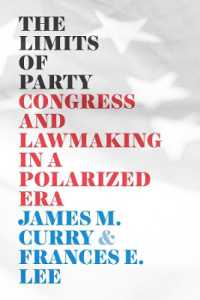- ホーム
- > 洋書
- > 英文書
- > History / World
Full Description
Western exploitation of other peoples is inseparable from attitudes and practices relating to other species and the extra-human environment generally. Colonial depredations turn on such terms as 'human', 'savage', 'civilised', 'natural', 'progressive', and on the legitimacies governing apprehension and control of space and landscape. Environmental impacts were reinforced, in patterns of unequal 'exchange', by the transport of animals, plants and peoples throughout the European empires, instigating widespread ecosystem change under unequal power regimes (a harbinger of today's 'globalization').
This book considers these imperial 'exchanges' and charts some contemporary legacies of those inequitable imports and exports, transportations and transmutations. Sheep farming in Australia, transforming the land as it dispossessed the native inhabitants, became a symbol of (new, white) nationhood. The transportation of plants (and animals) into and across the Pacific, even where benign or nostalgic, had widespread environmental effects, despite the hopes of the acclimatisation societies involved, and, by extension, of missionary societies "planting the seeds of Christianity." In the Caribbean, plantation slavery pushed back the "jungle" (itself an imported word) and erased the indigenous occupants - one example of the righteous, biblically justified cultivation of the wilderness. In Australia, artistic depictions of landscape, often driven by romantic and 'gothic' aesthetics, encoded contradictory settler mindsets, and literary representations of colonial Kenya mask the erasure of ecosystems. Chapters on the early twentieth century (in Canada, Kenya, and Queensland) indicate increased awareness of the value of species-preservation, conservation, and disease control. The tension between traditional and 'Euroscientific' attitudes towards conservation is revealed in attitudes towards control of the Ganges, while the urge to resource exploitation has produced critical disequilibrium in Papua New Guinea. Broader concerns centering on ecotourism and ecocriticism are treated in further essays summarising how the dominant West has alienated 'nature' from human beings through commodification in the service of capitalist 'progress'.
Contents
Acknowledgements
Illustrations
Helen TIFFIN: Introduction
Leigh DALE: Empire's Proxy: Sheep and the Colonial Environment
Claudia BRANDENSTEIN: Representations of Landscape and Nature in Anthony Trollope's The West Indies and the Spanish Main and James Anthony Froude's The English in the West Indies
Meenakshi SHARMA: Polluted River or Goddess and Saviour? The Ganga in the Discourses of Modernity and Hinduism
Helen GILBERT: Ecotourism: A Colonial Legacy?
Andrew MCCANN: Colonial Nature-Inscription: On Haunted Landscapes
Ruth BLAIR: "Transported Landscapes": Reflections on Empire and Environment in the Pacific
Carrie DAWSON: The "I" in Beaver: Sympathetic Identification and Self-Representation in Grey Owl's Pilgrims of the Wild
Robert DIXON: The Sandline Mercenaries Affair: Postcoloniality, Globalization and the Nation-State
Anna JOHNSTON: Planting the Seeds of Christianity: Ecological Reform in Nineteenth-Century Polynesian London Missionary Society Stations
Chris TIFFIN: Five Emus to the King of Siam: Acclimatization and Colonialism
Susie O'BRIEN: "Back to the World": Reading Ecocriticism in a Postcolonial Context
Catherine HOWELL: Views from Van Diemen's Land: Space, Place and the Colonial Settler Subject in John Glover's Landscapes
Jo ROBERTSON: Colonial Cordon Sanitaire: Fixing the Boundaries of the Disease Environment
Gillian WHITLOCK: "The Animals Are Innocent": Latter-Day Women Travellers in Africa
Contributors
Index







